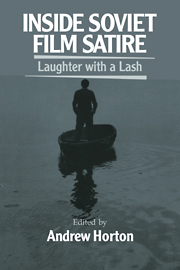Book contents
- Frontmatter
- Contents
- Foreword: If life itself is a satire …
- Acknowledgments
- Editor's note
- Introduction: Carnival versus lashing laughter in Soviet cinema
- Part One The long view: Soviet satire in context
- Part Two Middle-distance shots: The individual satire considered
- Part Three Close-ups: Glasnost and Soviet satire
- XII A forgotten flute and remembered popular tradition
- XIII Perestroika of kitsch: Sergei Soloviev's Black Rose, Red Rose
- XIV Carnivals bright, dark, and grotesque in the glasnost satires of Mamin, Mustafayev, and Shakhnazarov
- XV Quick takes on Yuri Mamin's Fountain from the perspective of a Romanian
- XVI “One should begin with zero”: A discussion with satiric filmmaker Yuri Mamin
- Filmography
- Contributors
- Index
XV - Quick takes on Yuri Mamin's Fountain from the perspective of a Romanian
Published online by Cambridge University Press: 07 October 2009
- Frontmatter
- Contents
- Foreword: If life itself is a satire …
- Acknowledgments
- Editor's note
- Introduction: Carnival versus lashing laughter in Soviet cinema
- Part One The long view: Soviet satire in context
- Part Two Middle-distance shots: The individual satire considered
- Part Three Close-ups: Glasnost and Soviet satire
- XII A forgotten flute and remembered popular tradition
- XIII Perestroika of kitsch: Sergei Soloviev's Black Rose, Red Rose
- XIV Carnivals bright, dark, and grotesque in the glasnost satires of Mamin, Mustafayev, and Shakhnazarov
- XV Quick takes on Yuri Mamin's Fountain from the perspective of a Romanian
- XVI “One should begin with zero”: A discussion with satiric filmmaker Yuri Mamin
- Filmography
- Contributors
- Index
Summary
Romanian reality was a clone of Soviet reality for four decades. We lived in the same apartment building, spoke the same artificial pseudolanguages, and were seized by the same profound sense of the absurd. We all lived in Mamin's building, and are all going down in it and with it. In that sense, Mamin's metaphor of a communal apartment house in Moscow is big enough to accommodate all of us now grubbing in the ruins of the “Grand Experiment.” Fountain is a communal metaphor about community in several of its guises: precommunity (the nomad tribe), faux community (several of these, corresponding to Soviet leaders), and finally, postcommunity (which resembles Marx's “primitive Communism,” from whence a supposedly rational Communism was going to arise — and did: into faux community.) Of all of these, only the nomad community makes any sense because its life is based on ecological necessity, that is, water.
There was a pure spring tended by an Orthodox monk at a hermitage in the mountain woods of Transylvania when I went there in July 1990. The monk looked a thousand years old, and he'd written in old-fashioned script on a yellowing piece of cardboard tacked over the spring: God's water. Drink and Be Blessed.
- Type
- Chapter
- Information
- Inside Soviet Film Satire , pp. 149 - 153Publisher: Cambridge University PressPrint publication year: 1993

